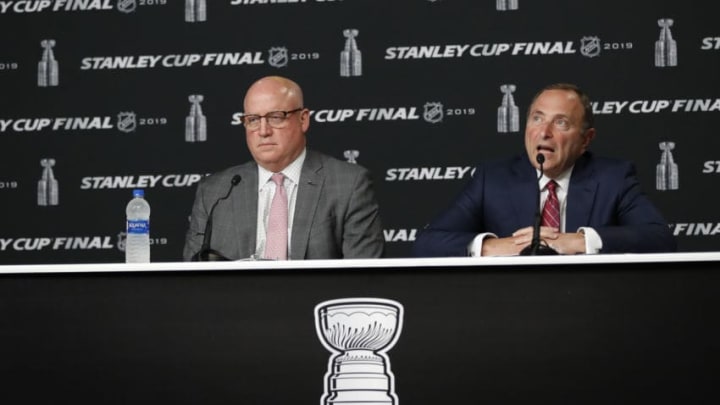TSN’s Gord Miller proposed some changes to the NHL salary cap via Twitter. It seems like a sensible solution to one of hockey’s most controversial economic problems.
In the world of hockey business, there aren’t many words that strike fear into the hearts of general managers and player agents as much as “salary cap”. It was the implementation of the salary cap that led to an entire NHL season being lost forever to be immortalized on the Stanley Cup as “season not played”. The salary cap since its inception has been controversial and will most likely remain so, but that doesn’t mean it could go unchanged.
Supporters of the salary cap argue that it evens the playing field, thus creating a more competitive NHL. With teams only allowed to give out a finite amount of contract money, and not a penny more, the talent is more evenly distributed.
Well, at least it should be in theory. The salary cap is an imperfect system, at best, so there’s always room for improvement. Gord Miller from TSN had an interesting take on how to change the system.
One thing I would like to see change with the NHL salary cap is an exemption of some sort (25%?) for players who were drafted by a team, have been with them for 5+ years and re-sign. Teams shouldn’t be punished for drafting and developing well. https://t.co/WioOdodLcA
— Gord Miller 🌻🇺🇦 (@GMillerTSN) June 28, 2019
More from Puck Prose
- Detroit Red Wings 2023 Rookie Camp Has Plenty of Ups and Downs
- This Columbus Blue Jackets rookie doesn’t want to be forgotten
- 2 trades the Boston Bruins must make to secure the Stanley Cup
- 3 reasons the Avalanche won’t win the Stanley Cup in 2024
- This is a big year for Alex Turcotte and the Los Angeles Kings
Players and player’s agents are sure to see the idea as a win, because it means larger contracts are coming their way. Hockey purists would love the idea because it puts more focus on the draft, and shuns the notion that teams can build exclusively through free agency. The best teams are built rather than bought, after all.
The salary cap was meant to increase competitiveness league-wide, namely for small market teams who couldn’t compete as well in the age of the unregulated, free agency trade market.
Any fears of a team having an exodus of talent, especially with players in their prime years, could be put at ease.
For example, imagine how the NHL would look today if the New Jersey Devils had a better chance of keeping Zach Parise. Or if the Nashville Predators had a better chance to keep Ryan Suter. Or if the New York Islanders had a better chance to keep John Tavares.
Granted, not all those players’ decisions to leave were motivated by money. No matter how wide the Islanders could open their checkbook, that doesn’t change the fact that a young Tavares slept in Maple Leafs pajamas every night, dreaming of playing for Toronto.
But teams that draft well enough to have multiple players whose talent warrants hefty contracts shouldn’t be punished for it. Rather, they should be looked at as an example of what can go right if you draft properly.
One of the most telling stories of the free agency era was the post cap crunch the 2010 Chicago Blackhawks faced. After winning their first Stanley Cup since the 1960’s the team was forced to shed many of its players to avoid a cap disaster.
What was left was a team that bared little resemblance to the team that beat the Philadelphia Flyers for hockey’s ultimate prize, although key pieces like Patrick Kane and Jonathan Toews remained. Although the Blackhawks obviously rebounded to form their own dynasty, it seems unfair that the team was more or less punished for their 2010 success.
A potential detractor to Miller’s plan is that it would effectively end the era of free agency as we know it. With teams incentive to keep their draft picks around a little longer, there won’t be as much exciting bombshell news reports coming out every July 1st.
Sure, some players might not come to terms with their team and hit free agency, others may wish for a change in scenery, so some of the excitement might still carry over. But money talks, and with more of it on the table, players might be able to suppress that urge to play for their boyhood team to cash a check with a few extra zeros in it.
Among the four major sports, the NHL’s implementation of a hard salary cap remains one of sport’s businesses most controversial moves. If Miller’s suggestion comes to fruition, the NHL would be only the second league, after Major League Baseball, to allow teams to go over the salary cap. Unlike baseball’s, Miller’s suggestion is good for the teams, the players, and the sport as a whole.
